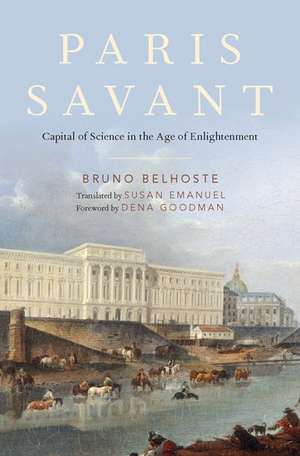Paris Savant: Capital of Science in the Age of Enlightenment
Autor Bruno Belhosteen Limba Engleză Hardback – 5 sep 2019
Preț: 254.50 lei
Nou
Puncte Express: 382
Preț estimativ în valută:
48.70€ • 52.89$ • 40.91£
48.70€ • 52.89$ • 40.91£
Carte tipărită la comandă
Livrare economică 11-17 aprilie
Preluare comenzi: 021 569.72.76
Specificații
ISBN-13: 9780199382545
ISBN-10: 0199382549
Pagini: 328
Ilustrații: 32
Dimensiuni: 239 x 163 x 25 mm
Greutate: 0.64 kg
Editura: Oxford University Press
Colecția OUP USA
Locul publicării:New York, United States
ISBN-10: 0199382549
Pagini: 328
Ilustrații: 32
Dimensiuni: 239 x 163 x 25 mm
Greutate: 0.64 kg
Editura: Oxford University Press
Colecția OUP USA
Locul publicării:New York, United States
Recenzii
This book paints a fascinating portrait of Enlightenment Paris in which the reader is invited to walk alongside the author through the streets, parks, and buildings where scientific history was made. It is a masterful introduction to the study and practice of science in eighteenth-century Paris. Chapters of Paris Savant could serve as stand-alone readings for undergraduate courses, as each begins with a well-chosen episode introducing people and places involved in different aspects of Enlightenment science. Furthermore, Susan Emanuel's fluid English translation makes this entire book a pleasure to read.
Belhoste's work is an important contribution to Enlightenment studies, to our understanding of the Republic of Letters, and to the history of science. Itbrings together an intimate knowledge of French intellectual life with a deep understanding of the history of science—all narrated with eloquence and ease.
... a long-overdue and much-needed work about the French Academy of Sciences and its ecosystem in eighteenth-century Paris... Belhoste paints a vivid picture of the Parisian scientific landscape in that transformational era... It is lively and enjoyable, and will provide the encouragement to further explore the hidden side of scientific Paris.
Originally published in French in 2011 (Colin), Susan Emanuel's outstanding translation brings Belhoste's important work to many more readers and scholars interested in the Enlightenment, the history of science, the history of Paris, and the workings of the Republic of Letters...Belhoste's thesis is that Paris functioned as the center of the Republic of Letters in the eighteenth century by virtue of its expansive and organized scientific programs and endeavors.
Belhoste's work is an important contribution to Enlightenment studies, to our understanding of the Republic of Letters, and to the history of science. Itbrings together an intimate knowledge of French intellectual life with a deep understanding of the history of science—all narrated with eloquence and ease.
... a long-overdue and much-needed work about the French Academy of Sciences and its ecosystem in eighteenth-century Paris... Belhoste paints a vivid picture of the Parisian scientific landscape in that transformational era... It is lively and enjoyable, and will provide the encouragement to further explore the hidden side of scientific Paris.
Originally published in French in 2011 (Colin), Susan Emanuel's outstanding translation brings Belhoste's important work to many more readers and scholars interested in the Enlightenment, the history of science, the history of Paris, and the workings of the Republic of Letters...Belhoste's thesis is that Paris functioned as the center of the Republic of Letters in the eighteenth century by virtue of its expansive and organized scientific programs and endeavors.
Notă biografică
Professor Belhoste studied history and history of science at the University Paris 1, obtaining his PhD in 1982 with a dissertation on the life and work of the mathematician Augustin-Louis Cauchy. He obtained his Habilitation in 2001 with a dissertation on the history of the Ecole polytechnique from 1794 to 1870. He was a researcher at the National Institute for Pedagogical in Paris (1986-2003) and a professor in the history of science at the University Paris 10 Nanterre (2003-2007) as well as at the University Paris 1 Panthéon Sorbonne (2007-2018). He was also the head of the Institut d'histoire moderne et contemporaine (CNRS-ENS-Paris 1) (2014-2017), and has been Emeritus Professor since September 2018.
